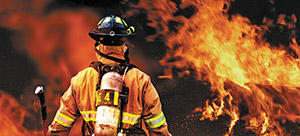
When a tragedy happens, we say we have no words. We are momentarily speechless that something so terrible could happen. It becomes hard to think of what to say, and it’s impossible to truly express our grief. But I think that once the initial moments pass, it’s important for us to say something, whether as words of consolation or as ideas on how to prevent the tragedy from happening again. We need to have some words, something to say. And that’s why I’m writing right now about a tragedy.
It was all over the news—a fire broke out in a Brooklyn building because of a hot plate left on over Shabbos, and seven young children perished while a child and her mother are in critical condition. I’m not going to claim that I ever had any connection to the Sassoon family, but both as a Jew and as a human being I grieve for all of them. I grieve for the children who will never get a chance to grow up. I grieve for the injured who need to contend with both their injuries and the dark new reality they must face. And I grieve for the children’s father, who wasn’t home at the time and has come home to this terrible situation.
It could have been any of us. That’s the scary part. It wasn’t as if this was a gas leak or an act of arson or something relatively out of the ordinary that caused the fire. It was a hot plate. A contraption that many of us use on Shabbos to keep our food warm. My family often uses a hot plate to keep some pieces of chicken or a kugel warm and inviting, and it seems perfectly safe. But now the hot plate also looks like it could be a deathtrap. Should we all keep using them? Or should we take a second look and decide whether it is really worth the risk? Admittedly this doesn’t happen with the vast majority of hot plates. It probably doesn’t make sense to get rid of them all. But at the least, this episode should make us think about them, and maybe to try to find ways to make them safer.
Now I’d like to speak about the human element. How should anyone cope with this? What is there to say? I have felt grief before, myself—one of my grandmothers, zichronah l’bracha, and one of my grandfathers, zichrono l’bracha, both passed away in the past few years. But I know it’s impossible to compare it to the grief of losing so many children and of losing your home. I can’t really give advice on how to cope or to move on, or if one should truly move on from this sort of tragedy. I will say that I wish the best to anyone affected by this, and hope that they will find the strength to come together and to strengthen each other.
There is one group of people in this story whom I’d like to wholeheartedly commend—the firefighters. They always work their hardest to save whomever they can and to salvage whatever is possible to protect. Unfortunately in this case they weren’t able to save everyone, but they battled the blaze and put in their strongest effort. We need to appreciate our firefighters more and what they do; that’s something that often gets forgotten when a story about a devastating blaze breaks out, but it’s something that’s important to remember.
Tragedy is often the impetus for change. We’ve seen many examples of this in recent memory. For instance, Operation Protective Edge broke out in Israel as a nearly direct result of the discovery of the bodies of the kidnapped boys. And in Ferguson, Mo. protests and calls for change broke out after the shooting of Michael Brown. And as terrible as this current tragedy is, it should also become a stimulus for some improvement. For instance, I’ve been hearing that Brooklyn doesn’t have a burn center to treat those injured by fire. That should become a priority to those living in the borough and in the surrounding areas—with a place like that, we can prevent more deaths and heal more injuries. And I mentioned the hot plate earlier; is there any way we can make it safer or find a new solution for how to keep our food warm while staying within the boundaries of Halacha?
It may be impossible to fully move on from this for everyone involved. But we should come together as a people, learn from this, and help strengthen each other so that we can move forward. My condolences to anyone affected by this fire or any other fire, and I pray for you every moment I can.
Oren Oppenheim, age 17, is a junior at Ramaz Upper School in Manhattan and lives in Fair Lawn, NJ. He spends his free time writing and reading, and hopes to become a published novelist, but currently is drowning in emails from colleges. You can email him at [email protected] and see his photography at facebook.com/orenphotography.
By Oren Oppenheim








